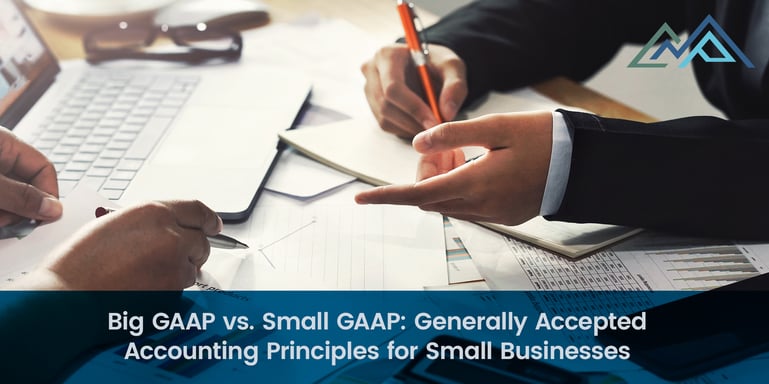Generally Accepted Accounting Principles, commonly called GAAP, dictate how publicly traded companies must handle their accounting. The GAAP provides a set of accounting and reporting standards to ensure that investors and the SEC understand a company’s financial status.
Investors and lenders sometimes require private companies to issue GAAP-compliant financial statements. In recent years, the topic of whether private companies should have a separate set of GAAP-like standards has been under debate.

At CMP, our business clients often ask us about big GAAP vs little GAAP. Here’s what you need to know.
What is the Difference Between Big GAAP and Little GAAP?
The focus of the GAAP debate is the complexity of GAAP standards and whether they should apply to private companies. Many accountants believe that GAAP is too complex and burdensome for private companies to use. There is also the belief that the needs of private company financial statements may differ from those of public companies.
The GAAP standards that apply to public companies are known as big GAAP. They include a strict set of reporting requirements that dictate how companies account for their money. They’re designed to protect investors and ensure that the SEC has a clear picture of an organization’s value and financial health.
Little GAAP is less of a fixed set of standards and more of an ongoing debate. While private and not-for-profit companies are not required to adhere to GAAP, there are reasons that support the need for a set of standards that applies to them.
There are two issues that make GAAP standards less than ideal for private companies:
- It can be expensive to switch to GAAP accounting
- GAAP requirements don’t always serve the needs of private company owners and investors
Back in 2014, the Financial Accounting Standards Board (FASB), which governs GAAP, created a Private Company Council to discuss the possibility of creating a separate set of standards for private companies. They ultimately decided against it, but they issued updates addressing some of the GAAP issues for private companies. These changes included:
- Amortization of goodwill. Update 2014-02 laid out standards for private companies to account for goodwill, which is an intangible asset.
- Derivatives and hedging. Update 2014-03 provides a simplified hedge accounting method designed to help private companies.
- Variable interest entities. Update 2014-07 provides an alternative to entities with similar ownership that have economic reliance between them. This allows private companies to avoid the cost and complexity of the VIE standards that apply to public companies.
- Business combinations. Update 2014-18 provides an amended set of standards to help private companies account for intangible assets when businesses are combined.
The FASB’s Private Company Council designed these alternatives to make it more palatable and affordable for private companies to adopt GAAP standards.
Why You Should Follow GAAP
Adhering to GAAP standards is still voluntary for private businesses, so you may wonder why you should consider adopting GAAP with the modifications issued for private businesses. We recommend it for the following reasons:
- GAAP standards make it easy for you and potential investors to evaluate and understand your financial reports.
- Following GAAP reporting standards with modifications for private companies ensures consistency in your financial statements.
- GAAP standards help to build trust with your stakeholders by providing them with a predictable framework for evaluating their financial interest in your company.
- Failure to adhere to GAAP standards can result in fines for public companies. Like public companies, private companies can run into problems if their financial reporting isn’t held to a high standard of accuracy and consistency.
- It may be easier to sell your company if you adhere to GAAP standards. For example, if a publicly traded company wanted to acquire your business, using GAAP standards would simplify the process because your accounting standards would already align with theirs.
We believe switching to GAAP standards is an investment worth making. If you proceed with this change, we suggest hiring a professional accountant to help with the switch to GAAP accounting. The process can be unwieldy and confusing to business owners who don’t have a background in accounting.
Don't Forget Your eBook:
FREE GAAP Guide for Small Businesses
Upcoming and New Changes to GAAP for Business Owners
We’ve already outlined the four major changes adopted by the FASB’s Private Company Council in 2014, but the FASB updates its standards every year. While most of the standards adopted are not required for private companies, it’s still a good idea to know what’s changing.
Many of the recent changes come from the FASB’s Emerging Issues Task Force, which identifies potential issues with GAAP and makes recommendations on how to address them.
It is important to note that one 2016 update does directly apply to private companies. Update 2016-03 addresses the adoption timeline of the new rules set out for private companies in 2014. Here’s what the FASB said about it:
The Private Company Council (PCC) added this issue to its agenda in response to concerns raised by private company stakeholders about the required assessment of preferability when electing a private company accounting alternative for the first time after its effective date.
The 2016 update allows for private companies who choose to use the four GAAP alternatives adopted in 2014 to do so at any time. It addressed concerns that requiring private entities to adopt the rules on a fixed timeline would be prohibitively expensive.
It is also worth noting that for private companies that choose to comply with the full set of GAAP standards, updates are issued every year. Only a small number of these updates apply specifically to private companies. You can find a full list of the yearly updates on the FASB’s website, here.
Conclusion
The big GAAP vs little GAAP debate hasn’t been fully resolved, and it’s likely to be a topic of ongoing discussion at upcoming FASBs. We are closely following the ongoing debate on behalf of our clients.
Are you considering adopting GAAP standards for your company? CMP's Financial statement services are tailored to get your small business on track with accounting standards.

















